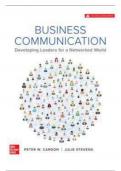, SOLUTION MANUAL FOR BUSINESS COMMUNICATION
DEVELOPNING LEADERS FOR A NETWORKED WORLD 2ND
EDITION BY PETER CARDON, JULIE STEPHENS
Chapter 1:
Establishing Credibility
IM 4-1
,Chapter Summary
In this chapter, we discuss the ways that business executives and the business community establish
trust. Then, we focus on three components of credibility: competence, caring, and character. First,
however, you will read a short scenario about choosing a mentor. Each potential mentor has credibility
but for different reasons.
Learning Objectives
LO1.1 Explain the importance of establishing credibility for business communication.
LO1.2 Describe how competence, caring, and character affect your credibility as a communicator.
LO1.3 Define and explain business ethics, corporate values, and personal values.
LO1.4 Explain the FAIR approach to ethical business communications.
PowerPoint Notes and Outline
Slide 1-3
In most business situations, others make judgments about what you say, write, and do based on your
credibility.
Business communications occur in the context of working relationships, all of which depend on trust.
Credibility has always been important to business relationships, yet its importance has grown in recent
years with an increasingly interdependent, knowledge-based workplace.
Slide 1-4
Given the high-profile business misdeeds in recent years (i.e., SNC-Lavalin, Bombardier, Volkswagen, and
Boeing), trust in businesses and business executives has dropped to all-time lows. As depicted in Figure
1.1, the trust extended by Canadians to business leaders is far lower than the trust extended to
members of other selected professions.
Slide 1-5
The public also increasingly views companies and other institutions with less trust. One of the most well-
known and publicized trust indexes is developed by Edelman, a prominent communications firm.
IM 4-2
, Edelman experts measure trust in institutions, including business, nongovernmental organizations
(NGOs), government, and media in 28 countries.
In 2022, Canada remained a “neutral” country in terms of its trust index (countries are labelled
“trusters,” “distrusters,” and “neutral”), although it had dropped three index points from the previous
year. Canada had been a “distruster” in 2018 but moved to “neutral” in 2019.
Slide 1-6
Figure 1.1. How will you overcome public perceptions to build credibility? A Look at Trust in Various
Professions.
Slide 1-7
Perhaps most concerning is that business students are among the worst offenders.
When asked in anonymous surveys if they had cheated to get into graduate school, many students
admitted to having done so: 43 percent of liberal arts students, 52 percent of education students, 63
percent of medical students, 63 percent of law students, and 75 percent of business students.
Think about that! Three-quarters of graduate-level business students admitted to some form of cheating
to get into their programs. In another study involving hypothetical ethical dilemmas, convicts in
minimum-security prisons scored as high on unethical behaviour as MBA students.
Slide 1-8
You will often find yourself needing to establish credibility in this post-trust era. As a future manager
and executive, you can control your reputation as a credible communicator by focusing on three well-
established factors: competence, caring, and character. Research has shown that these three factors
almost entirely account for whether a person is considered credible in professional situations.
As depicted in Figure 1.2, credibility is like a three-legged stool. Without any one element, it is
compromised.
Slide 1-9
Your entire business program is likely centered on developing competence in a certain business
discipline and/or industry.
You may already have significant business experience. If you’re a novice, seeking internships and jobs
related to your discipline will help you develop competence.
IM 4-3





